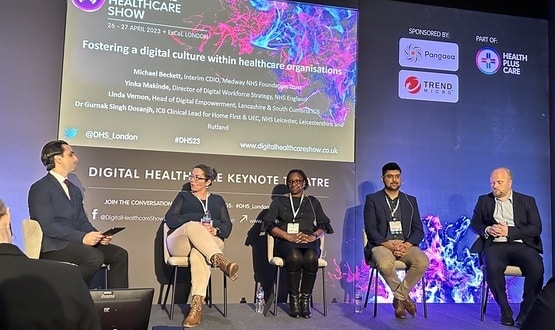The NHS will know it has been successful when everyone in and around the organisation is not using the word ‘digital’ and it instead becomes “a fundamental part of our DNA”, according to Yinka Makinde, director of digital workforce strategy at NHS England.
Speaking today at The Digital Healthcare Show, part of Health Plus Care 2023 in London, Makinde was presenting on a panel in the opening session of the show in the Keynote Theatre, titled ‘Fostering a digital culture within healthcare organisations’.
Makinde recognised the need for the NHS to undergo a significant cultural shift towards digital, and said it needs to become ingrained to the point where the word digital is no longer put in front of the word health or in various NHS job titles.
She said: “How we will know we are successful in this is when we are not using the word digital and it becomes a fundamental part of our DNA.
“We’re not quite there yet… we still have a bit to go but we are starting to put in the functions and tools to get there and we need to get there faster now.”
Makinde was joined on the panel by Gurnak Singh Dosanjh, ICB clinical lead for home first and UEC at NHS Leicester, Leicestershire and Rutland. Dosanjh stressed that “culture and digital culture is not just about digital components, it is a whole culture shift”.
He highlighted the importance of patient engagement and referenced a virtual wards programme he has been involved in where patients themselves were heavily involved.
“In order to shift NHS culture, patients must be brought along on the journey,” he added.
Makinde and Dosanjh were joined by Linda Vernon, head of digital empowerment at Lancashire and South Cumbria ICB, and Michael Beckett, interim CDIO at Medway NHS Foundation Trust, who both shared the same vision that “digital is an enabler” and patients must be brought along with clinicians.
Ingraining a mindset and a skillset
The significance of digital becoming a culture and way of life for the NHS was echoed in a session about ‘Digital and data literacy for the health and social care workforce.’
Chair of this session Andy Bleadon, director – communities at ECHAlliance, made the point that “we don’t call it digital banking or digital shopping, it is just banking and shopping, but we call it digital health”.
“We need to get to a point where it is just health… in five years this show should be The Healthcare Show and not The Digital Healthcare Show,” he added.
Chief analyst at the Health Economics Unit, David Sgorbati, said that a key reason why the word digital is used a lot within the healthcare sector is because “we can struggle to attract the right skill sets in the public sector”, but if digital was more ingrained in NHS culture from early on in people’s careers there wouldn’t be as desperate a need to attract those skillsets.
The idea of focussing on the culture within the NHS in order to achieve a digital transformational change rather than just the technology has been around for a number of years. Digitalisation guru Tom Loosemore highlighted this very idea at Digital Healths Autumn Leadership Summit in 2021.

